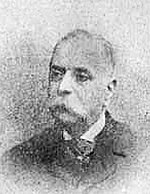Abdallah Marrash | |
|---|---|
 | |
| Native name | عبد الله بن فتح الله بن نصر الله مرّاش |
| Born | 14 May 1839 Aleppo, Ottoman Syria |
| Died | 17 January 1900 (aged 60) Marseille, France |
| Nationality | Ottoman, British |
| Relatives |
|
Abdallah bin Fathallah bin Nasrallah Marrash (Arabic: عبد الله بن فتح الله بن نصر الله مرّاش, ALA-LC: ʻAbd Allāh bin Fatḥ Allāh bin Naṣr Allāh Marrāsh; 14 May 1839[1] – 17 January 1900) was a Syrian writer involved in various Arabic-language newspaper ventures in London and Paris.
Life
Abdallah Marrash was born in Aleppo, a city of Ottoman Syria, to an old Melkite family of merchants known for their literary interests.[2] Having earned wealth and standing in the 18th century, the family was well established in Aleppo,[3] although they had gone through troubles: a relative of Abdallah, Butrus Marrash, was killed by the wali's troops in the midst of a Catholic–Orthodox clash in April 1818.[4] Other Melkite Catholics were exiled from Aleppo during the persecutions, among them the priest Jibrail Marrash.[5][a] Abdallah's father, Fathallah, tried to defuse the Sectarian conflict by writing a treatise in 1849, in which he rejected the Filioque.[7] He had built up a large private library[8] to give his three children Francis, Abdallah and Maryana a thorough education, particularly in the field of Arabic language and literature.[9]
Aleppo was then a major intellectual center of the Ottoman Empire, featuring many thinkers and writers concerned with the future of the Arabs.[10] It was in the French missionary schools that the Marrash family learnt Arabic with French, and other foreign languages (Italian and English).[10] After studying in Aleppo, Abdallah went to Europe to pursue his studies while devoting himself to trade.[11]
Having established himself in Manchester by 1863,[12] he became a naturalized British subject on 6 May 1868 under Aliens Act 1844,[13] and on 11 July 1872 under Naturalization Act 1870 (33 & 34 Vict. c. 14).[14][15] He accessed the collections of Arabic manuscripts in London and Paris and copied what he thought was useful to his Middle Eastern compatriots.[11] In 1879, he helped Adib Ishaq found the Parisian journal Misr al-Qahira (Egypt the Victorious).[16] Marrash founded Kawkab al-Mashriq (The Star of the Orient), a monthly Parisian Arabic-French bilingual journal, the first issue of which was published on 23 June 1882; it was ephemeral.[17] In 1882, Marrash settled down in Marseille, where he died on 17 January 1900.[18] He had been a member of the Société Asiatique.[19]
Notes
- ^ Little is known about the lives of Butrus Marrash and Jibrail Marrash. Butrus was married by the time he was killed, and the name of his father was Nasrallah Marrash; Niqula al-Turk wrote a funeral ode for him.[6]
References
- ^ Griolet & Vergé 1905, p. 76.
- ^ Wielandt 1992, p. 119; Zeidan 1995, p. 50.
- ^ Wielandt 1992, p. 119; Hafez 1993, p. 274.
- ^ Wielandt 1992, p. 120; Charon 1903, p. 115; Kuroki 1993, pp. 6–7.
- ^ Charon 1903, p. 115.
- ^ Wielandt 1992, p. 120; Charon 1903, p. 115.
- ^ Wielandt 1992, p. 120.
- ^ Zeidan 1995, p. 50.
- ^ Wielandt 1992, p. 122; Tomiche 1991, p. 598.
- ^ a b Tomiche 1991, p. 598.
- ^ a b Veccia Vaglieri 1940, p. 285: "II Marrash ebbe un fratello 'Abdallah, che, fatti i suoi studi in Aleppo, passò in Europa, dove, pur dedicandosi al commercio, continuò a coltivare gli studi. Egli frequentava le raccolte di manoscritti arabi esistenti a Parigi e Londra e copiava quello che riteneva utile ai suoi compatriotti".
- ^ Strakers' Annual Mercantile, Ship & Insurance Register, p. 78.
- ^ Accounts and Papers of the House of Commons 1868 (named as "Marrash, Abdoulah").
- ^ Accounts and Papers of the House of Commons 1875.
- ^ Journal du droit international privé, p. 155.
- ^ Génériques 1990, p. 121; Ayalon 1995, p. 44.
- ^ Ayalon 1987, p. 177.
- ^ Griolet & Vergé 1905, p. 77.
- ^ Journal asiatique.
Sources
- Accounts and Papers of the House of Commons. Vol. 55. Ordered to be printed. 1868.
- Accounts and Papers of the House of Commons. Vol. 61. Ordered to be printed. 1875.
- Ayalon, Ami (1987). Language and Change in the Arab Middle East: the Evolution of Modern Arabic Political Discourse. Oxford University Press. ISBN 978-0195041408.
- Ayalon, Ami (1995). The Press in the Arab Middle East: A History. Oxford University Press. ISBN 978-0195087802.
- Charon, Cyrille (1903). "L'Église grecque melchite catholique (Suite.)". Revue des études byzantines (in French). 6 (39): 113–118. doi:10.3406/rebyz.1903.3453.
- Griolet, Gaston; Vergé, Chales-Paul-Laurent, eds. (1905). Jurisprudence générale. Deuxième partie (in French). Dalloz.
- Génériques [in French] (1990). Presse et mémoire : France des étrangers, France des libertés (in French). Éditions de l'Atelier. ISBN 978-2908833003.
- Hafez, Sabry (1993). The Genesis of Arabic Narrative Discourse: a Study in the Sociology of Modern Arabic Literature. Saqi Books. ISBN 978-0-86356-149-8.
- Journal asiatique (in French). Société asiatique. 1875.
- Journal du droit international privé (in French). Vol. 31. 1904.
- Kuroki, Hidemitsu (1993). "The Orthodox-Catholic Clash in Aleppo in 1818". Orient. 29: 1–18. doi:10.5356/orient1960.29.1.
- Strakers' Annual Mercantile, Ship & Insurance Register. S. Straker & Sons. 1862.
- Tomiche, N. (1991). "Marrās̲h̲, Fransīs b. Fatḥ Allāh b. Naṣr". Encyclopaedia of Islam, Second Edition. Vol. 6. Brill. doi:10.1163/1573-3912_islam_SIM_4971. ISBN 978-90-04-08112-3.
- Veccia Vaglieri, Laura (1940). "Notizie bio-bibliografiche su autori arabi moderni". Annali dell'Istituto Universitario Orientale (in Italian). 1 (27).
- Wielandt, Rotraud (1992). "Fransis Fathallah Marrashs Zugang zum Gedankengut der Aufklärung und der französischen Revolution". In van Gelder, Geert Jan; de Moor, Ed (eds.). The Middle East and Europe: Encounters and Exchanges (in German). Rodopi Publishers. ISBN 978-90-5183-397-3.
- Zeidan, Joseph T. (1995). Arab Women Novelists: the Formative Years and Beyond. State University of New York Press. ISBN 978-0-7914-2172-7.








